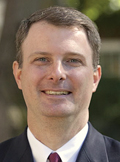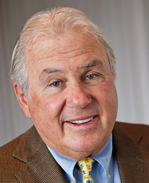
Photograph by Stephanie Mitchell/Harvard News Office
Drew Faust

Photograph by Stephanie Mitchell/Harvard News Office
Robert D. Reischauer
As a fundamental part of the Harvard Corporation’s overhaul of its membership and practices, enacted in December 2010, the senior governing board established committees focused on several of its core responsibilities—and determined, further, to appoint to them people who are not members of the Corporation itself, to provide the board with access to broader and deeper expertise. The committees have been appointed, as previously reported, and in a recent conversation about the Corporation’s work, Senior Fellow Robert D. Reischauer and President Drew Faust expressed satisfaction that the committees’ operation to date has resulted in better and more efficient Corporation decisionmaking. They also said that, with the committees functioning, the Corporation itself had been able to give more time to probing strategic issues of long-term significance to Harvard—one of the fundamental aims of the governance reforms.
Upon request, Reischauer agreed to share the formal charters for each committee, as adopted last summer (by the Corporation) and fall (in the case of the Board of Overseers, for the joint committee described below). They are summarized below. Reviewing them together provides some sense of the Corporation’s priorities and concerns, and the issues involved in leading the institution at the senior levels of Harvard administration and management. They also provide insight into the powerful role accorded the Senior Fellow, who under the reform measures is no longer simply the longest-serving Corporation member.
Committee on Governance
The Senior Fellow is chair, and the president a member ex officio. Additional members include two to four Corporation members, nominated by the Senior Fellow in consultation with the president. The committee’s principal staff person is the Secretary to the Corporation (Marc Goodheart). The committee’s responsibilities are detailed thus:
The Committee on Governance will nominate candidates to be members of the Corporation (other than the President). The Committee will also determine means for effective involvement of members of the Board of Overseers in identifying and nominating such candidates.
The Committee will nominate Corporation members and, where applicable, other persons who are not Corporation members, for service on standing committees of the Corporation.
The Committee will regularly consider such aspects of governance as the Committee or the Corporation shall determine require attention, and it shall report to the Corporation as circumstances warrant. The Committee shall from time to time review the effectiveness of the operations and procedures of the Corporation and of its committees, in order to assure regular attention to best practices. It shall consider the allocation and flow of work between and among the Corporation and its committees. It shall also consider how to further sound relations between the Corporation and the Board of Overseers.
The Committee shall plan the appropriate orientation of new Corporation members and committee members. It shall assess the service of individual members of the Corporation and its committees and consider the appropriate duration of their service. It shall also take the lead in appropriate review of the President’s service from time to time and make recommendations to the Corporation concerning the President’s performance and compensation.
The Committee shall from time to time review conflict-of-interest policies that apply to members of the Corporation and its committees, and it shall consider and resolve specific matters that arise thereunder, unless in the view of the Committee circumstances warrant Corporation review and action.
As reported previously, the committee’s five-year review of Faust’s presidency is under way.

Photograph by Jon Chase/Harvard News Office
Lawrence S. Bacow

Photograph by Stephanie Mitchell/Harvard News Office
Katie Lapp

Photograph by Stephanie Mitchell/Harvard News Office
Mark R. Johnson
Committee on Facilities and Capital Planning
The committee is to have between six and 11 members, with Corporation members filling a majority of the seats; a Corporation member is to serve as chair (Lawrence S. Bacow is the current chair). The Senior Fellow, in consultation with the president, nominates the chair, and the committee on governance nominates all other members, with all nominations subject to Corporation election. The principal staff are the executive vice president (Katie Lapp) and the vice president for capital planning and project management (Mark R. Johnson).
The committee’s charge follows:
The Committee on Facilities and Capital Planning will consider, and will present for Corporation review and approval where appropriate, policies and processes for campus and capital planning and development. This will include the consideration of land and structures, building design and landscape design, and utilities infrastructure and capital equipment.
The Committee will oversee the development of physical master plans for the University, which will be reviewed by the Committee and presented for Corporation review and approval where appropriate.
The Committee, in appropriate consultation with the Committee on Finance, will foster the development of capital plans for the University and its major constituent units, will monitor and advise on the University’s capital planning processes, will review capital expenditures, and will consider policies and processes related to capital expenditures, deferred maintenance, and capital project risk management, presenting such matters for Corporation review and approval where appropriate.
The Committee will review and make recommendations to the Corporation in regard to individual major capital projects that require specific Corporation approval under applicable Corporation votes.
Since her appointment in 2009, Lapp has created a five-year capital-planning process and appointed Johnson to lead that and related functions. After Harvard’s experience during the prior decade (announcing an ambitious program for University development of 10 million square feet of new facilities in Allston, and beginning construction of a $1.4-billion science complex, only to halt both in the wake of the 2008 financial crisis and the sharp erosion in the value of the endowment), a new, more coordinated approach to planning, project design and financing, and construction now exists. Major facilities investments are now much more closely coordinated among schools, subject to central administrative review, and, through the new committee, vetted for Corporation consideration in the context of Harvard’s finances.
The new approach to Allston development (involving third-party and commercial developers, co-developer partners, and future academic planning for direct Harvard uses), as well as various facilities priorities beginning to emerge from planning for the University’s forthcoming capital campaign, will be an obvious focus for this committee’s work.

Photograph by Justin Ide/Harvard News Office
Daniel Shore
Committee on Finance
The committee’s membership is similar to that of the facilities and capital planning group, with the treasurer (a Corporation member, currently James Rothenberg) serving ex officio. The method of appointment is the same, as well. Reischauer is the current chair. The committee is staffed by the executive vice president (Katie Lapp, again) and the vice president for finance (Daniel Shore). Its responsibilities are described this way:
The Committee on Finance will consider and recommend University financial policies for the approval of the Corporation.
The Committee will review and report to the Corporation on the University's financial planning and budgeting processes. The Committee will review the annual budgets and multiyear financial plans of the University and report on and transmit them to the Corporation for consideration. The Committee will provide advice to the Facilities and Capital Planning Committee and to the Corporation on financial aspects of capital projects and capital plans. The Committee will also review and make recommendations to the Corporation concerning extraordinary financial transactions and proposed expenditures not previously described in budgets that have been reviewed by the Corporation.
The Committee will review and make annual recommendations to the Corporation concerning distributions and decapitalizations from the endowment. In addition, it will from time to time review and make recommendations concerning endowment spending policy.
The Committee will make recommendations to the Corporation on policies regarding debt and liquidity and from time to time will report to the Corporation on the University’s debt portfolio, its sources of financing, and other aspects of the University’s capital structure as appropriate.
The Committee will assure due attention to financial risk management, in concert with the Joint Committee on Inspection [an existing Corporation-Board of Overseers audit committee].
The Committee will review and make annual recommendations to the Corporation concerning tuition, enrollments, and financial aid.
These responsibilities obviously extend not only to such major issues as long-term budgeting, the nature of the University’s balance sheet, and endowment spending, but also, perhaps surprisingly, to such traditional, annual Corporation discussions as the appropriate level of tuition—increasingly, a lightning rod for public attention.
During the 2008-2009 financial crisis, Harvard found itself locked into illiquid investments at a time when access to other sources of liquid funds were constrained. In addition, swap agreements it had entered into in anticipation of financing rapid construction of Allston projects misfired, subjecting it to further liquidity strains and large cash and paper losses.
In the wake of that unnerving experience, the University has taken much greater care to coordinate its endowment investment policies with its shorter-term financing and cash needs; has taken liquidity into greater account in endowment investments and in the management of its short-term funds; and has seemingly moved toward longer-term financial plans overall. These measures, in concert with the capital-planning process, are apparently subjected to more in-depth, formal, and expert Corporation analysis, discussion, and approval through the new committee structure.

Photograph by Justin Ide/Harvard News Office
Joseph J. O'Donnell
Joint Committee on Alumni Affairs and Development
The committee—a departure for the Corporation, which had not formally signaled its interest in fundraising and development before the 2010 reforms—has 15 to 25 members, including three to six Corporation members and not fewer than five members of the Board of Overseers. One Corporation member and one Overseer serve as co-chairs, nominated respectively by the Senior Fellow (in consultation with the president) and by the president-elect or president of the Board of Overseers. The current co-chairs are Corporation member Joseph J. O’Donnell, a Boston business executive, and Diana Nelson ’84, an Overseer and past co-chair of the Harvard College Fund, who is a director of the Carlson Companies, the privately held lodging and travel company. (O’Donnell is also one of four co-chairs of the committee planning the forthcoming capital campaign). The principal staff person is the vice president for alumni affairs and development (Tamara Elliott Rogers).
As the charter makes clear, the committee is focused on encouraging and sustaining financial support for Harvard:
The Joint Committee on Alumni Affairs and Development will consider and recommend policies and strategies related to encouraging philanthropic support of the University. It will also seek to promote strong and continuing relations with Harvard alumni and alumnae, conducive to their lifelong engagement with the University.
The Committee will monitor and advise on fundraising issues, results, and trends. It will consider appropriate strategies and practices for attracting and stewarding gifts from a wide range of alumni and non-alumni sources, including individuals, foundations, and corporations. As needed, it will recommend guidelines regarding the coordination of approaches to prospective donors, the awarding of “credit” for gifts, and the costing of various gift opportunities. The Committee will also advise on policy regarding the naming of programs, positions, or facilities in connection with gifts. In addition, it will advise on the timing, size, and purposes of fundraising campaigns by the University or its constituent parts.
The Committee will consider and make recommendations relating to ways of fostering regular communications with alumni, to keep them informed about the University and to invite their continuing involvement with Harvard. It will also consider ways to engage alumni through events on and off campus, through the network of clubs and interest groups, and through opportunities for education, travel, and service.
How successful this committee is in coming years will have an enormous impact on Harvard as a whole—and on the issues and opportunities the finance and facilities committees will address on the Corporation’s and the University’s behalf.







